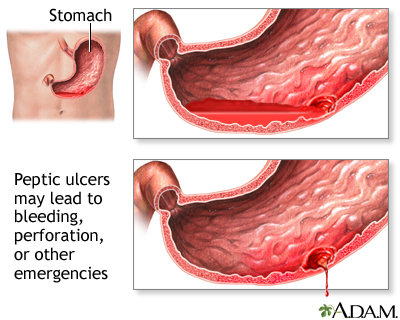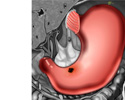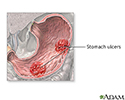Peptic ulcer
Ulcer - peptic; Ulcer - duodenal; Ulcer - gastric; Duodenal ulcer; Gastric ulcer; Dyspepsia - ulcers; Bleeding ulcer; Gastrointestinal bleeding - peptic ulcer; Gastrointestinal hemorrhage - peptic ulcer; G.I. bleed - peptic ulcer; H. pylori - peptic ulcer; Helicobacter pylori - peptic ulcer
A peptic ulcer is an open sore or raw area in the lining of the stomach or intestine.
- A gastric ulcer occurs in the stomach.
- A duodenal ulcer occurs in the first part of the small intestine.
Causes
Normally, the lining of the stomach and small intestines can protect itself against strong stomach acids. But if the lining breaks down, the result may be:
-
Swollen and inflamed tissue, called (
gastritis
)
Gastritis
Gastritis occurs when the lining of the stomach becomes inflamed or swollen. Gastritis can last for only a short time (acute gastritis). It may als...
 ImageRead Article Now Book Mark Article
ImageRead Article Now Book Mark Article - An ulcer
Most ulcers occur in the first layer of the inner lining. A hole that goes all the way through the stomach or duodenum is called a perforation . A perforation is a medical emergency.
Perforation
Perforation is a hole that develops through the wall of a body organ. This problem may occur in the esophagus, stomach, small intestine, large intes...

The most common cause of ulcers is infection of the stomach by bacteria called Helicobacter pylori ( H pylori ). Most people with peptic ulcers have these bacteria living in their digestive tract. Yet, many people who have these bacteria in their stomach do not develop an ulcer.
The following factors raise your risk for peptic ulcers:
- Drinking too much alcohol
- Regular use of aspirin, ibuprofen, naproxen, or other nonsteroidal anti-inflammatory drugs (NSAIDs). Taking aspirin or NSAIDs once in a while is safe for most people.
- Smoking cigarettes or chewing tobacco
- Being very ill, such as being on a breathing machine
- Having radiation treatments
A rare condition called Zollinger-Ellison syndrome causes stomach and duodenal ulcers.
Zollinger-Ellison syndrome
Zollinger-Ellison syndrome is a condition in which the body produces too much of the hormone gastrin. Most of the time, a small tumor (gastrinoma) i...

Many people believe that stress causes ulcers. It is not clear if this is true for normal stress.
Symptoms
Small ulcers may not cause any symptoms. Some ulcers can cause serious bleeding.
Abdominal pain is a common symptom. The pain can differ from person to person, and some people have no pain.
Abdominal pain
Abdominal pain is pain that you feel anywhere between your chest and groin. This is often referred to as the stomach region or belly.

Other symptoms include:
- Feeling of fullness and problems drinking as much fluid as usual
- Hunger and an empty feeling in the stomach, often 1 to 3 hours after a meal
- Mild nausea that may go away with vomiting
- Pain or discomfort in the upper abdomen
- Pain in the upper abdomen that wakes you up at night
Other possible symptoms include:
-
Bloody or dark tarry stools
Bloody or dark tarry stools
Bloody stools often are a sign of a problem in the digestive tract. Blood in the stool may come from anywhere along your digestive tract from your m...
Read Article Now Book Mark Article -
Chest pain
Chest pain
Chest pain is discomfort or pain that you feel anywhere along the front of your body between your neck and upper abdomen.
 ImageRead Article Now Book Mark Article
ImageRead Article Now Book Mark Article -
Fatigue
Fatigue
Fatigue is a feeling of weariness, tiredness, or lack of energy.
Read Article Now Book Mark Article - Vomiting, possibly bloody
-
Weight loss
Weight loss
Unexplained weight loss is a decrease in body weight, when you did not try to lose the weight on your own. Many people gain and lose weight. Uninten...
Read Article Now Book Mark Article
Exams and Tests
To diagnose an ulcer, you may need a test called an upper endoscopy (EGD).
- This is a test to examine the lining of the esophagus (the tube that connects your throat to your stomach), stomach, and first part of the small intestine.
- It is done with a small camera (flexible endoscope) that is inserted down the throat.
- This test most often requires sedation given through an IV
Upper endoscopy is done on most people when peptic ulcers are suspected or when you:
- Have a low blood count (anemia)
- Have trouble swallowing
- Are vomiting blood or your stools are blood or dark and tarry looking
- Have been losing weight without trying
-
Have other findings that raise a concern for
cancer in the stomach
Cancer in the stomach
Stomach cancer is cancer that starts in the stomach.
 ImageRead Article Now Book Mark Article
ImageRead Article Now Book Mark Article
Testing for H. pylori is also needed.
H. pylori
Helicobacter pylori (H. pylori) is the bacteria (germ) responsible for most stomach and duodenal ulcers and many cases of stomach inflammation (chro...
Other tests you may have include:
-
Hemoglobin
blood test to check for
anemia
Hemoglobin
Hemoglobin is a protein in red blood cells that carries oxygen. The hemoglobin test measures how much hemoglobin is in your blood.
 ImageRead Article Now Book Mark Article
ImageRead Article Now Book Mark ArticleAnemia
Anemia is a condition in which the body does not have enough healthy red blood cells. Red blood cells provide oxygen to body tissues. Different type...
 ImageRead Article Now Book Mark Article
ImageRead Article Now Book Mark Article -
Stool occult blood test
to test for blood in your stool
Stool occult blood test
The stool guaiac test looks for hidden (occult) blood in a stool sample. It can find blood even if you cannot see it yourself. It is the most commo...
 ImageRead Article Now Book Mark Article
ImageRead Article Now Book Mark Article
Sometimes, you may need a test called an upper GI series. A series of x-rays are taken after you drink a thick substance called barium. This does not require sedation.
Upper GI
An upper GI and small bowel series is a set of x-rays taken to examine the esophagus, stomach, and small intestine. Barium enema is a related test....

Treatment
In order for your ulcer to heal and to reduce the chance it will come back, you will be given medicines to:
- Kill the H pylori bacteria (if present)
- Reduce acid levels in the stomach
Take all of your medicines as you have been told. Other changes in your lifestyle can also help.
Changes in your lifestyle
You have peptic ulcer disease (PUD). A peptic ulcer is an open sore or raw area in the lining of the stomach (gastric ulcer) or upper part of the sm...
If you have a peptic ulcer with an H pylori infection, the standard treatment uses different combinations of the following medicines for 7 to 14 days:
- Two different antibiotics to kill H pylori
- Proton pump inhibitors such as omeprazole (Prilosec), lansoprazole (Prevacid), or esomeprazole (Nexium)
- Bismuth (the main ingredient in Pepto-Bismol) may be added to help kill the bacteria
If you have an ulcer without an H pylori infection, or one that is caused by taking aspirin or NSAIDs, you will likely need to take a proton pump inhibitor for 8 weeks.
You may also be prescribed this type of medicine regularly if you must continue taking aspirin or NSAIDs for other health conditions.
Other medicines used for ulcers are:
- Misoprostol, a drug that may help prevent ulcers in people who take NSAIDs on a regular basis
- Medicines that protect the tissue lining (such as sucralfate)
If a peptic ulcer bleeds a lot, an EGD may be needed to stop the bleeding. Methods used to stop the bleeding include:
- Injecting medicine in the ulcer
- Applying metal clips or heat therapy to the ulcer
Surgery may be needed if:
- Bleeding cannot be stopped with an EGD
- The ulcer has caused a tear
Outlook (Prognosis)
Peptic ulcers tend to come back if untreated. There is a good chance that the H pylori infection will be cured if you take your medicines and follow your health care provider's treatment advice. You will be much less likely to get another ulcer.
Possible Complications
Complications may include:
- Severe blood loss
- Scarring from an ulcer may make it harder for the stomach to empty
- Perforation or hole of the stomach and intestines
When to Contact a Medical Professional
Get medical help right away if you:
- Develop sudden, sharp abdominal pain
- Have a rigid, hard abdomen that is tender to touch
-
Have symptoms of
shock
, such as fainting, excessive sweating, or confusion
Shock
Shock is a life-threatening condition that occurs when the body is not getting enough blood flow. Lack of blood flow means that the cells and organs...
 ImageRead Article Now Book Mark Article
ImageRead Article Now Book Mark Article - Vomit blood or have blood in your stool (especially if it is maroon or dark, tarry black)
Call your provider if:
- You feel dizzy or lightheaded.
- You have ulcer symptoms.
Prevention
Avoid aspirin, ibuprofen, naproxen, and other NSAIDs. Try acetaminophen instead. If you must take such medicines, talk to your provider first. Your provider may:
- Test you for H. pylori before you take these medicines
- Have you take proton pump inhibitors (PPIs) or an acid blocker
- Have you take a drug called misoprostol
The following lifestyle changes may help prevent peptic ulcers:
- DO NOT smoke or chew tobacco.
- Limit alcohol to no more than two drinks per day.
References
Chan FKL, Lau JYW. Peptic ulcer disease. In: Feldman M, Friedman LS, Brandt LJ, eds. Sleisenger and Fordtran's Gastrointestinal and Liver Disease. 10th ed. Philadelphia, PA: Elsevier Saunders; 2016:chap 53.
Kuipers EJ, Blaser MJ. Acid peptic disease. In: Goldman L, Schafer AI, eds. Goldman's Cecil Medicine . 25th ed. Philadelphia, PA: Elsevier Saunders; 2016:chap 139.
Laine L, Jensen DM. Management of patients with ulcer bleeding. Am J Gastroenterol . 2012;107(3):345-360. PMID: 22310222 www.ncbi.nlm.nih.gov/pubmed/22310222 .
Morgan DR, Crowe SE. Helicobacter pylori infection. In: Feldman M, Friedman LS, Brandt LJ, eds. Sleisenger and Fordtran's Gastrointestinal and Liver Disease. 10th ed. Philadelphia, PA: Elsevier Saunders; 2016:chap 51.
-
Úlcera estomacal
Animation
-
Ulcer emergencies - illustration
Peptic ulcers may lead to emergency situations. Severe abdominal pain with or without evidence of bleeding may indicate a perforation of the ulcer through the stomach or duodenum. Vomiting of a substance that resembles coffee grounds, or the presence of black tarry stools, may indicate serious bleeding.
Ulcer emergencies
illustration
-
Gastroscopy procedure - illustration
H pylori
Gastroscopy procedure
illustration
-
Location of peptic ulcers - illustration
A peptic ulcer is an open sore or raw area in the lining of the stomach (gastric) or the upper part of the small intestine (duodenal).
Location of peptic ulcers
illustration
-
Cause of peptic ulcers - illustration
H.pylori
Cause of peptic ulcers
illustration
-
Stomach disease or trauma - illustration
An ulcer is a crater-like lesion on the skin or mucous membrane caused by an inflammatory, infectious, or malignant condition. To avoid irritating an ulcer a person can try eliminating certain substances from their diet such as caffeine, alcohol, aspirin, and avoid smoking. Patients can take certain medicines to suppress the acid in the stomach causing the the erosion of the stomach lining. Endoscopic therapy can be used to stop bleeding from the ulcer.
Stomach disease or trauma
illustration
-
Ulcer emergencies - illustration
Peptic ulcers may lead to emergency situations. Severe abdominal pain with or without evidence of bleeding may indicate a perforation of the ulcer through the stomach or duodenum. Vomiting of a substance that resembles coffee grounds, or the presence of black tarry stools, may indicate serious bleeding.
Ulcer emergencies
illustration
-
Gastroscopy procedure - illustration
H pylori
Gastroscopy procedure
illustration
-
Location of peptic ulcers - illustration
A peptic ulcer is an open sore or raw area in the lining of the stomach (gastric) or the upper part of the small intestine (duodenal).
Location of peptic ulcers
illustration
-
Cause of peptic ulcers - illustration
H.pylori
Cause of peptic ulcers
illustration
-
Stomach disease or trauma - illustration
An ulcer is a crater-like lesion on the skin or mucous membrane caused by an inflammatory, infectious, or malignant condition. To avoid irritating an ulcer a person can try eliminating certain substances from their diet such as caffeine, alcohol, aspirin, and avoid smoking. Patients can take certain medicines to suppress the acid in the stomach causing the the erosion of the stomach lining. Endoscopic therapy can be used to stop bleeding from the ulcer.
Stomach disease or trauma
illustration
-
Peptic ulcer
(Alt. Medicine)
-
Peptic ulcers
(In-Depth)
Review Date: 1/28/2016
Reviewed By: Subodh K. Lal, MD, gastroenterologist with Gastrointestinal Specialists of Georgia, Austell, GA. Review provided by VeriMed Healthcare Network. Also reviewed by David Zieve, MD, MHA, Isla Ogilvie, PhD, and the A.D.A.M. Editorial team.










